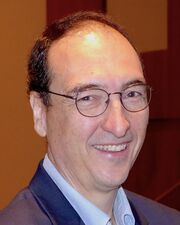Difference between revisions of "User:Murray"
Jump to navigation
Jump to search
| (One intermediate revision by the same user not shown) | |||
| Line 1: | Line 1: | ||
| − | [[Image:Murray-14Dec2016.jpg|left]] | + | [[Image:Murray-14Dec2016.jpg|left|180px]] |
| − | Richard M. Murray received the B.S. degree in Electrical Engineering from California Institute of Technology in 1985 and the M.S. and Ph.D. degrees in Electrical Engineering and Computer Sciences from the University of California, Berkeley, in 1988 and 1991, respectively. | + | Richard M. Murray received the B.S. degree in Electrical Engineering from California Institute of Technology in 1985 and the M.S. and Ph.D. degrees in Electrical Engineering and Computer Sciences from the University of California, Berkeley, in 1988 and 1991, respectively. He is currently the Thomas E. and Doris Everhart Professor of Control & Dynamical Systems and Bioengineering at Caltech. Murray's research is in the application of feedback and control to networked systems, with applications in biology and autonomy. Current projects include analysis and design of biomolecular feedback circuits, synthesis of discrete decision-making protocols for reactive systems, and design of highly resilient architectures for autonomous systems. |
| − | |||
| − | |||
* [http://www.cds.caltech.edu/~murray Richard Murray's homepage] | * [http://www.cds.caltech.edu/~murray Richard Murray's homepage] | ||
Latest revision as of 18:45, 23 December 2020
Richard M. Murray received the B.S. degree in Electrical Engineering from California Institute of Technology in 1985 and the M.S. and Ph.D. degrees in Electrical Engineering and Computer Sciences from the University of California, Berkeley, in 1988 and 1991, respectively. He is currently the Thomas E. and Doris Everhart Professor of Control & Dynamical Systems and Bioengineering at Caltech. Murray's research is in the application of feedback and control to networked systems, with applications in biology and autonomy. Current projects include analysis and design of biomolecular feedback circuits, synthesis of discrete decision-making protocols for reactive systems, and design of highly resilient architectures for autonomous systems.
